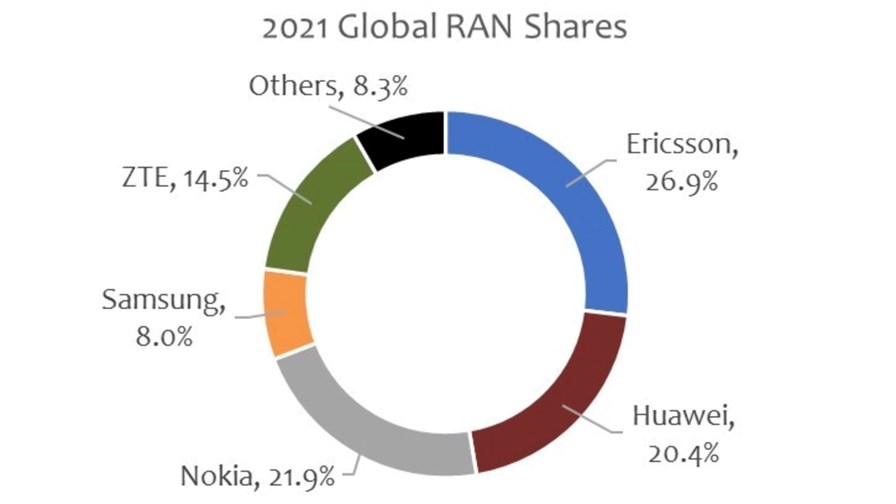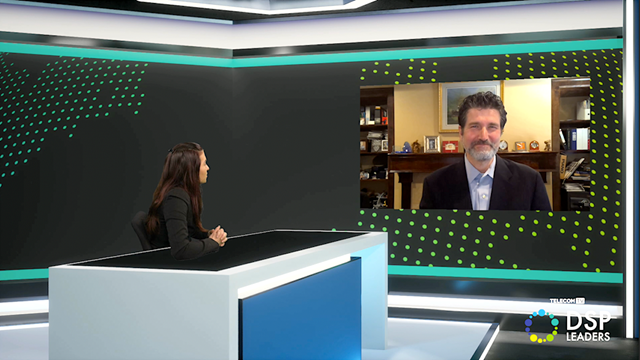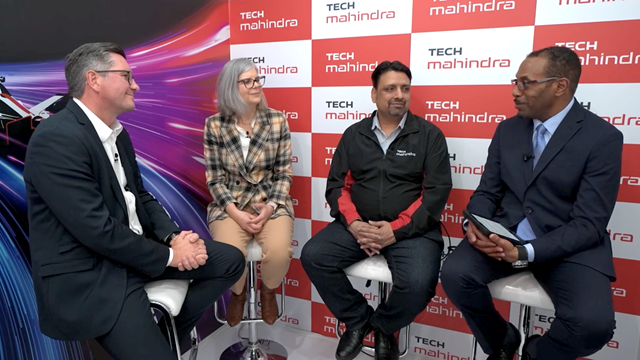
Source: Mobile Experts
- Huawei loses its RAN market crown, says Mobile Experts
- Vodafone UK’s 3G network heads for retirement
- Bharti Airtel commissions solar plant to boost its energy efficiency efforts
A not-altogether-unexpected shift in the global RAN market rankings, a step towards a 3G sunset in the UK, and a green development in India top today’s news chart.
Huawei lost its RAN market crown to Ericsson in 2021, according to research undertaken by analyst firm Mobile Experts. According to the company, Huawei dropped to third place in the RAN market in terms of the value of sales with a 20.4% market share, trailing Nokia (21.9% market share) and leader Ericsson, which achieved a 26.9% share of a market that grew by about 3% in value to be worth in the region of $45 billion last year. ZTE achieved fourth place (14.5%) ahead of Samsung (8% market share). Huawei’s RAN sales were hit by its “inability to produce high-capacity TDD base stations” because of the supply chain impact of US sanctions. "Overall, the RAN market is looking up,” noted Mobile Experts Chief Analyst Joe Madden. “After 30 years of boom-and-bust cycles, the market is currently reaching a peak with 5G deployment in its active mode this year. In coming years, we see new revenue coming in from private enterprises to offset the natural drop in CSP sales; specifically, the private LTE/5G market will grow by 19%, accounting for more than $4 billion in 2026. As a result, the total RAN market will remain near its 5G peak for a few years, with the possibility for growth in the longer term," added Madden in this announcement.
Vodafone UK says it will start the process of switching off its 3G network in 2023 in a gradual process that will be preceded by a customer communication programme. “Retiring 3G, after 17 years and nearly 500 billion minutes of calls, is a key part of Vodafone’s strategy to give customers the most reliable network experience. Today, less than 4% of the data used on Vodafone’s network travels on 3G, in comparison to more than 30% in 2016,” the operator noted in this announcement. Vodafone UK says the move will enable it to refarm its 3G spectrum and boost the capacity of its 4G and 5G networks: The operator’s CEO Ahmed Essam explained the company is focused on “the technologies that best connect our customers and have the least impact on the environment.” He noted the move will result in a more reliable mobile experience and minimise the operator’s environmental footprint by removing a layer of its network that uses “inefficient equipment”: According to the operator, 5G networks are more than 10 times as energy-efficient as 3G networks. Kester Mann, Director of Consumer and Connectivity at CCS Insight, commented that Vodafone has already begun switching off 3G in Italy, Germany and the Netherlands. In the UK, the move should also help with the operator’s Open RAN plans: The operator’s Head of Performance and Radio, Ker Anderson, noted during a media briefing held in London last September that the widespread deployment of Open RAN technology would only make sense once the 3G network was retired. Vodafone last week announced the first deployment of Open RAN technology in its commercial network at a site just outside the city of Bath, UK. (See Vodafone fires up its first commercial Open RAN site.)
Indian operator Bharti Airtel boosted its environmental sustainability efforts by commissioning a 21-megawatt solar power plant in District Bhuldana, Maharashtra. The captive power unit spreads over 80 acres and will supply renewable energy to the operator’s subsidiary network of data centres, Nxtra. Expected savings in carbon emissions amount to 25,517 tonnes annually. “This is yet another step towards fulfilling our commitment to source more than 50% power requirements of our data centres through renewable energy sources in next 12 months and contribute to Airtel’s overall GHG emission reduction targets”, Rajesh Tapadia, CEO of Nxtra, commented. Airtel will partner with utility company Avaada for the development, which follows Nxtra’s previous commitments around energy savings, including the commissioning of two captive solar power units in the State of Uttar Pradesh to supply the power for its operations.
Christel Heydemann, currently Executive Vice President for Europe at energy management giant Schneider Electric, is set to be named as the next Orange Group CEO at a board meeting scheduled for this Friday, 28 January, according to multiple French media sources and Reuters. Heydemann, 47, would be the first female CEO of the telco if she is confirmed as the replacement for Stéphane Richard, who is set for his final day as Chairman and chief executive on 31 January. Heydemann was one of a trio of candidates shortlisted for the role: One of the others, Verizon Chief Revenue Officer, Frank Boulben, bowed out of the contest late last week. The other candidate is current Orange Executive Director Finance, Performance and Development (CFO) Ramon Fernandez, who appears to have missed out.
IHS Towers has added to its Latin America portfolio with the acquisition for $315 million of SP5, a subsidiary of Grupo Torresur (GTS) that owns 2,115 towers in Brazil. For further details, see this announcement.
A man with a hectic social life is getting the odd spot of work in between parties. Boris Johnson, the beleaguered head of the current Conservative administration in the UK, has announced the formation of the International Data Transfer Expert Council (IDTEC). It is a body that will give “independent advice” to the UK government on cross-border data flow following Brexit, which is now well and truly “done”, pretty much like the Prime Minister. The luminaries freely providing their altruistic and independent guidance and recommendations include representatives from Google, Microsoft and Mastercard as well as academics and scientists. The intent is to ensure that Global Britain “seizes” the opportunities that improved, worldwide, free and secure data sharing will confer. IDTEC will advise on the development of new data transfer mechanisms, systems and tools to create “data adequacy partnerships” with other nations. The first to be able to take advantage of the new regime will be Australia, Colombia, the Dubai International Finance Centre (not quite a country but what the heck?), Singapore, South Korea and the US. IDTEC’s inaugural meeting takes place today, and top of the agenda is an examination and analysis of “global opportunities and challenges for international transfers and how the UK can be a global leader in removing barriers to cross-border data flows…. to enable smoother and more straightforward transfers without the need for costly and often complicated contracts.” Currently the UK’s data-enabled exports run at some £83 billion per annum and it is hoped that IDTEC’s input will help boost that by a “considerable” sum, although no target figures have yet been announced.
In India, Vodafone Idea, a company that hasn’t turned a profit in more than five years and seemingly in a state of permanent crisis, is already losing subscribers hand-over fist. Ten per cent of subscribers voted with their feet and wallets over 2021 alone. Now comes the news that it has effectively decided to increase its already woeful churn rate by the simple expedient of upping its prices. Economic genius in action. The news comes after the telco agreed to a bailout plan that will result in the government taking a 35.8 per cent share of the operator. The telco owes about US$27 billion. The deal is based on the conversion of interest owed to the Indian authorities into equity in return for more time to calculate its “adjusted gross revenue” and a four-year moratorium on the payments for spectrum licences. Joint owners, Vodafone Group and Aditya Birla, will see their shareholding’s diluted to 28.5 per cent and 17.8 per cent, respectively. Unsurprisingly, Vodafone Idea’s share price took another battering as the news filtered out. It is down 14 per cent on last week. Some analysts say the bailout will merely delay the eventual collapse of Vodafone Idea, but the Indian government does not want to see it’s much-vaunted championing of real competition in the telecoms sector come to grief. If Vodafone Idea goes, India will be left with a de-facto telecoms duopoly and that would not be good - especially for consumers.
In the US, the Biden administration will, in the event of the invasion of the Ukraine, enforce on Russia the same export regulations that quickly brought Huawei to its knees and forced the company completely to change its global strategy and technological focus. The policy worked because Huawei lost all access to global electronics supplies. Deploying the Foreign Direct Product Rule would prevent Russia from importing smartphones, microprocessors, products with embedded integrated circuits, consumer electronic products and aircraft and vehicle components. However, although any such ban would have an impact on the Russian economy, it is not known how severe or effective it might be. Russian exports of comms technology are minimal in the extreme and insignificant on a global scale. What it might mean though is the final demise of the troupe of dancing girls who used to strut their stuff on stage and waft fragrantly through the corridors of some of the world’s biggest telecoms trade shows on behalf of a certain Russian company. It had nothing to do with technology, but they were noticed, in much the same way as a giraffe in wheeling a shopping trolley would be.
Helios Investment Partners is reportedly holding discussions with African operators and banks on ways to support their mobile money and digital payments platforms. Bloomberg, cited by TechCentral, said Helios was in continuous talks with market players as it saw significant opportunities in the continent where a significant portion of the population is unbanked but has access to Internet and can use smartphones for payments. Potential deals might be on the cards, as MTN Group signalled last year plans to spin out its financial services unit, while Airtel Africa secured a $100 million investment from Mastercard for its mobile money operations. More about Helios’s investment intentions in Africa can be found here.
Public cloud evangelist TelcoDR has announced that its CLOUD CITY, which stepped into Ericsson’s show floor shoes at the micro-event that was MWC21, will this year exist only as a ‘virtual experience.’ Ericsson is set to have a physical presence this year, taking its familiar Hall 2 space at Barcelona’s La Fira show halls.
- The staff, TelecomTV
Email Newsletters
Sign up to receive TelecomTV's top news and videos, plus exclusive subscriber-only content direct to your inbox.




